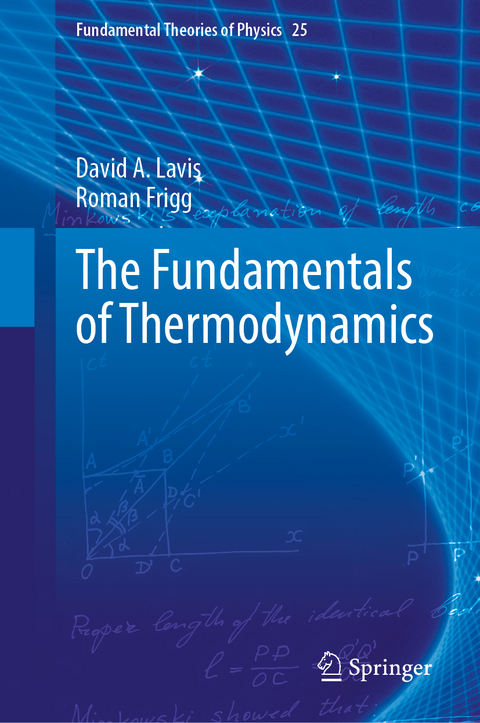
The Fundamentals of Thermodynamics
Springer International Publishing (Verlag)
9783031779473 (ISBN)
The aim of this text is to provide an account of the fundamentals of thermodynamics which is accessible at graduate level to physicists, mathematicians and philosophers of physics. The bulk of the book (Chapters 2-9) is based on the algebraic approach of Lieb and Yngvason, but extended to encompass both positive and negative temperatures and systems in which entropy increases and decreases in adiabatic processes. We show that these four possibilities are already present in Carathéodory's version of the Second Law which arises as a theorem from the axioms. We develop generalized versions of the Kelvin-Planck and Clausius formulations valid for the same range of systems. The parallel development in Chapter 10 takes a geometric approach. We discuss the limitations associated with the local nature of Carathéodory's Principle and present the resolution of this problem due to Boyling. Part of the aim here is to substantiate the claim of Arnold that the mathematical structure of thermodynamics is contact geometry. The last two chapters of the book extend the scope of the discussion to, respectively, critical phenomena and non-equilibrium systems. Chapter 11 is a presentation of phase transitions and critical phenomena in which we discuss universality and use scaling theory to derive scaling laws. Chapter 12 contains a generalization to non-equilibrium. We present the extension of Lieb and Yngvason's work to non-equilibrium and also give a brief account of classical irreversible thermodynamics (CIT). The latter enables a possible understanding of the way that the lack of a unique entropy function in the Lieb and Yngvason non-equilibrium approach can be resolved. The book is completed by a set of appendices which provide mathematical and physical support to the work in the main text.
David A. Lavis david.lavis@kcl.ac.uk Address: Department of Mathematics King's College London The Strand London WC2R 2LS, UK David Lavis is an Emeritus Senior Lecturer in the Department of Mathematics at King's College London (KCL) and a Research Associate in the Centre for Philosophy of Natural and Social Science at the London School of Economics. During his career, which has been mainly based at KCL, he has spent periods of leave as a lecturer at Makerere University, Uganda and as a researcher at the Institut Laue-Langevin, Genoble, France and at the Universities of Waterloo and Manitoba, Canada. His main research work and his extensive publications have been devoted to the investigation of phase transitions in complex lattice systems using mean-field, renormalization group and transfer matrix methods. The well-known Bell-Lavis model originated in a paper he wrote with G. M. Bell in 1970, with whom the first two of his three books on the statistical mechanics of lattice systems were co-authored. More recently he has researched and published papers on the conceptual foundations of thermodynamics and statistical mechanics with a particular concentration on the relationship between them.
Roman Frigg R.P.Frigg@lse.ac.uk Work Address: Department of Philosophy London School of Economics Houghton Street London WC2A 2AE UK England Roman Frigg is Professor of Philosophy in the Department of Philosophy, Logic and Scientific Method and a permanent visiting professor in the Munich Centre for Mathematical Philosophy of the Ludwig-Maximilians-University Munich. He is the winner of the Friedrich Wilhelm Bessel Research Award of the Alexander von Humboldt Foundation. His research interests lie in general philosophy of science and philosophy of physics. He has published papers on scientific representation, modelling, statistical mechanics, randomness, chaos, climate change, quantum mechanics, complexity, probability, scientific realism, computer simulations, reductionism, confirmation, and the relation between art and science. His research in the philosophy of physics focusses on statistical mechanics and thermodynamics. He is the author the Cambridge Element "Foundations of Statistical Mechanics" and he has published a large number of research papers on various aspects of statistical mechanics.
Introduction.- States and Processes.- Adiabatic Processes and the First Law.- Carathéodory's Principle and the Second Law.- Thermal Equilibrium and the Zeroth Law.- Single-System Entropy.- Entropy.- Temperature.- Cycles and Comparisons of Versions of the Second Law.- A Geometric Route to Entropy and Temperature.- Phase Transitions and Critical Phenomena.- Non-Equilibrium Theory.
| Erscheinungsdatum | 26.06.2025 |
|---|---|
| Reihe/Serie | Fundamental Theories of Physics |
| Zusatzinfo | XV, 499 p. 62 illus., 3 illus. in color. |
| Verlagsort | Cham |
| Sprache | englisch |
| Maße | 155 x 235 mm |
| Themenwelt | Naturwissenschaften ► Physik / Astronomie ► Thermodynamik |
| Schlagworte | Adiabatic Accessibility • Algebraic Approach to Thermodynamics • Axiomatic Thermodynamics • Boyling • Carathéodory's Principle • Entropy Decrease and Increase • Equilibrium Processes • first law of thermodynamics • Geometric Approach to Thermodynamics • Lieb • Negative Heat Capacity • Negative Temperature • non-equilibrium thermodynamics • Perpetual Motion Machines • Phase Transitions and Critical Phonomena • Quasistatic Processes • second law of thermodynamics • Simple Thermodynamic Systems • Yngvason • Zeroth law of thermodynamics |
| ISBN-13 | 9783031779473 / 9783031779473 |
| Zustand | Neuware |
| Informationen gemäß Produktsicherheitsverordnung (GPSR) | |
| Haben Sie eine Frage zum Produkt? |
aus dem Bereich


